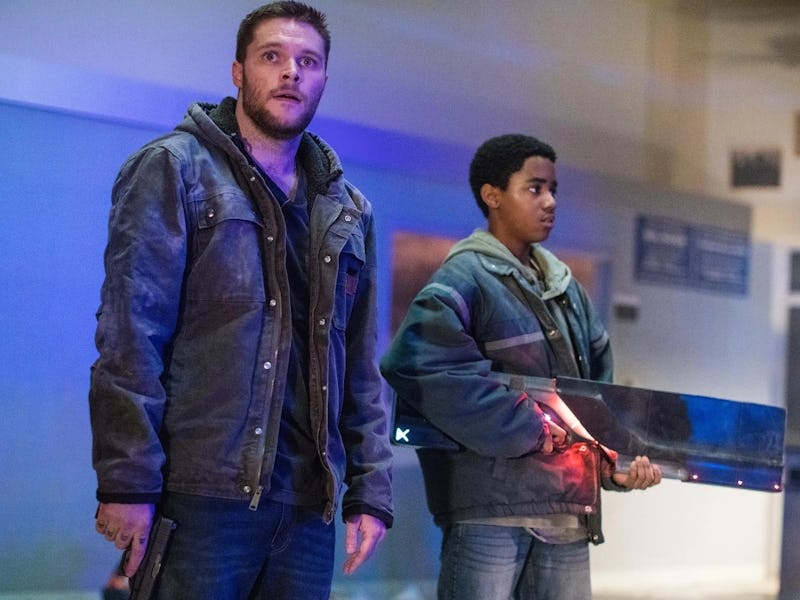A Promising Zoë Kravitz Sci-Fi Thriller Never Got the Sequel It Wanted, but It Remains Intriguing
If nothing else, there’s a lesson here about not spending too much time looking to the future.

It’s common for movies to end with sequel teases, and it’s just as common for those sequels to never materialize. That can be deeply frustrating for fans, especially when so much time is spent lobbying for Part 2 that the first installment squanders what should have been a compelling premise capable of standing on its own feet.
Few movies have primed themselves for a sequel as much as Jonathan and Josh Baker’s Kin, a sci-fi thriller that wonders what a kid from a hardscrabble Detroit background would do if he stumbled into possession of an alien laser cannon. It’s been five years. There is no Kin 2. Kin’s abysmal box office failure means there never will be a Kin 2. It’s farcical that the movie openly stumping for a sequel won’t get one, while movies that don’t deserve follow-ups get them anyway.
The dirge for Kin’s fate as a one-off, rather than the franchise it wants to be, belies its significant creative misfires, particularly in how the Bakers structure their ending. Consider the common complaint about the time investment modern TV needs. Episodes drift along for 45 minutes a pop, deploying chunks of exposition and setup until, suddenly, something dramatic happens. Then the show graduates from merely existing to “good,” or at least “watchable,” a dubious reward for viewers’ patience.
Kin, which the Bakers adapted from their 2014 short film The Bag Man, isn’t television, but in 102 minutes it replicates that same dynamic to stupefying effect. Just when things start getting awesome, the credits roll. The movie plays, but doesn’t actually begin until the finale, when Michael B. Jordan shows up to run a few lines and lay the foundation for a follow-up that never came.
Contrasting with Kin’s baffling conclusion is a common complaint about modern franchise filmmaking: no one makes anything original anymore. Studios build their release calendars out of established IP, because established IP’s pre-existing audience softens the risks of dumping hundreds of millions of dollars into a single production expected to reap huge profits. This makes Kin, an original concept shot on a relatively tiny $30 million budget, stand out from other sci-fi movies, and reemphasizes why the Bakers’ decision to jam Kin’s entire plot into its climax is so frustrating.
Characterization is important, but Kin’s family drama overwhelms its sci-fi elements.
Young Eli (Myles Truitt) forages for scrap in disused buildings, a supplemental income source to help support his adoptive father, Hal (Dennis Quaid), and brother, Jimmy (Jack Raynor). One night, he stumbles into the aftermath of a gun battle, and when rummaging through the bodies he happens upon a large gun seemingly alien in origin. The find leads to Eli and Jimmy fleeing from home alongside stripper Milly (Zoë Kravitz) while tailed by two parties who want the weapon for themselves: Taylor (James Franco), a murder-happy scumbag, and a pair of mysterious armored strangers.
The Bakers’ casting is solid, their concept is compelling, and their direction makes a strong case for their talent as filmmakers, but their premise loses steam as soon as it picks up. You’d think, for instance, that Eli would pipe up about the gun, which he stows in his backpack and says nothing about to Jimmy until an altercation forces his hand.
You’d also think the sci-fi elements would be central to the script, not backgrounded, but the chemistry shared by Truitt, Raynor, and Kravitz carries the story along whenever the Bakers forgot they’re making a genre movie. The film finally gains steam once those elements move to Kin’s forefront in its third act, but it’s too little, too late. The marriage between sci-fi and a character’s grounded circumstances can give audiences futuristic lenses for considering their own lives, but Kin hamstrings that dynamic by oscillating between sci-fi and family drama, leading to disharmony in how the film applies genre trappings to its class struggle narrative.
If you’re wondering what’s up with the Daft Punk lookalikes pursuing our heroes, you have to wait until the very end for a rushed explanation.
But there’s promise in the Bakers’ visual storytelling too, as well as in their gift for orchestrating big emotional beats. The finale reveals to us, and Eli, that he’s actually from another planet, stowed away on Earth by his biological brother (Jordan) for safekeeping as their homeworld teems with civil strife. The Bakers wear the Superman riff on their sleeves, alongside nods to Amblin Entertainment, the first two Terminator movies, and even King Arthur, a bevy of influences that lend Kin a distinct identity as a film about self-discovery and empowerment.
The fact we won’t get to see that identity explored in a sequel — and a hypothetical sequel to Kin would be the movie Kin ultimately fails to be — is a great disappointment. Kin’s audience shouldn’t have to sit through 90 minutes of padding before the movie actually lets itself be a movie. But that doesn’t make it any less of a shame that the Bakers haven’t been given the chance to make good on their own film’s payoff with a sequel that fully realizes their vision.
This article was originally published on